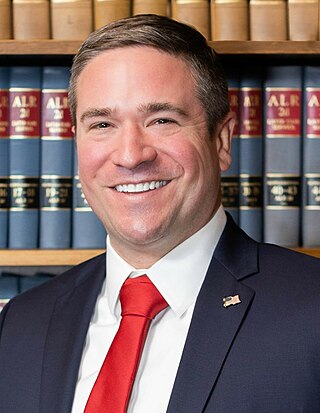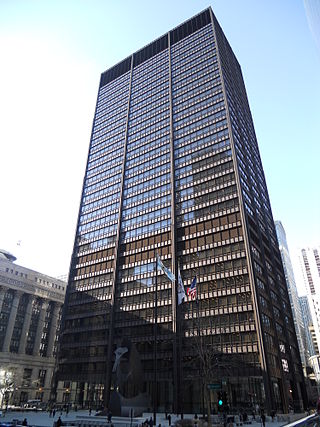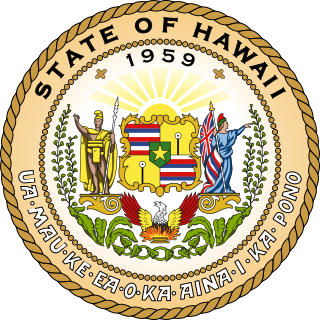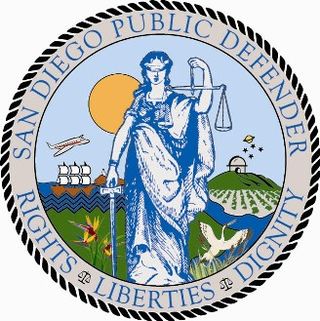
The Appellate Division of the Supreme Court of the State of New York is the intermediate appellate court in New York State. The state is geographically divided into four judicial departments of the Appellate Division. The full title of each is, using the "Fourth Department" as an example, the "Supreme Court of the State of New York, Appellate Division, Fourth Judicial Department".

In the United States, a district attorney (DA), county attorney, county prosecutor, state's attorney, prosecuting attorney, commonwealth's attorney, or solicitor is the chief prosecutor or chief law enforcement officer representing a U.S. state in a local government area, typically a county or a group of counties. The exact scope of the office varies by state. Generally, the prosecutor is said to represent the people of the jurisdiction in the state's courts, typically in criminal matters, against defendants. With the exception of three states, district attorneys are elected, unlike similar roles in other common law jurisdictions.

The Superior Court of the District of Columbia, commonly referred to as DC Superior Court, is the trial court for the District of Columbia, in the United States. It hears cases involving criminal and civil law, as well as family court, landlord and tenant, probate, tax and driving violations. All appeals of Superior Court decisions go to the District of Columbia Court of Appeals.
In criminal law, the right to counsel means a defendant has a legal right to have the assistance of counsel and, if the defendant cannot afford a lawyer, requires that the government appoint one or pay the defendant's legal expenses. The right to counsel is generally regarded as a constituent of the right to a fair trial. Historically, however, not all countries have always recognized the right to counsel. The right is often included in national constitutions. Of the 194 constitutions currently in force, 153 have language to this effect.
The Superior Court is the state court in the U.S. state of New Jersey, with statewide trial and appellate jurisdiction. The New Jersey Constitution of 1947 establishes the power of the New Jersey courts: under Article Six of the State Constitution, "judicial power shall be vested in a Supreme Court, a Superior Court, and other courts of limited jurisdiction." The Superior Court has three divisions: the Law Division which is the main trial court for cases of civil or criminal law, the Chancery Division, which tries equity law cases, and the Appellate Division, which is the intermediate appellate court in New Jersey. "Appeals may be taken to the Appellate Division of the Superior Court from the law and chancery divisions of the Superior Court and in such other causes as may be provided by law." Each division of the Superior Court is divided into various Parts."

The Office of the Missouri Attorney General was created in 1806 when Missouri was part of the Louisiana Territory. Missouri's first Constitution in 1820 provided for an appointed attorney general, but since the 1865 Constitution, the Attorney General has been elected. As of January 2023, there have been 44 attorneys general in Missouri.

The Indiana Attorney General is the chief legal officer of the State of Indiana in the United States. Attorneys General are chosen by a statewide general election to serve for a four-year term. The forty-fourth and current Attorney General is Todd Rokita.
The law of the Republic of China as applied in Taiwan, Penghu, Kinmen, and Matsu is based on civil law with its origins in the modern Japanese and German legal systems. The main body of laws are codified into the Six Codes:

The Judiciary of New York is the judicial branch of the Government of New York, comprising all the courts of the State of New York.

The Circuit Court of Cook County is the largest of the 25 circuit courts in the judiciary of Illinois as well as one of the largest unified court systems in the United States – second only in size to the Superior Court of Los Angeles County since that court merged with other courts in 1998.

The Superior Court of Los Angeles County is the California Superior Court located in Los Angeles County. It is the largest single unified trial court in the United States.
The Ohio Courts of Common Pleas are the trial courts of the state court system of Ohio.
The Cook County State's Attorney, Eileen O'Neill Burke, functions as the state of Illinois's district attorney for Cook County, Illinois, and heads the second-largest prosecutor's office in the United States. The office has over 600 attorneys and 1,200 employees. In addition to direct criminal prosecution, the state's attorney's office files legal actions to enforce child support orders, protect consumers and the elderly from exploitation, and assist thousands of victims of domestic violence every year.

The Civil Rights of Institutionalized Persons Act (CRIPA) of 1980 is a United States federal law intended to protect the rights of people in state or local correctional facilities, nursing homes, mental health facilities, group homes and institutions for people with intellectual and developmental disabilities.

The Office of the Attorney General (OAG) is an agency of the Oklahoma state government that is headed by the Attorney General of Oklahoma. The OAG is responsible for supervising the administration of justice across the State, providing legal assistance to the State government, and prosecuting violators of State law.
The Florida State Courts System is the unified state court system of Florida.

The Attorney General of Hawaii, the chief legal officer and chief law enforcement officer of Hawaii, is responsible for the Department of the Attorney General which is charged with advising the various other departments and agencies of the state government and for the prosecution of offenses under state law.
The headquarters of the Maryland Office of the Public Defender is located in the William Donald Schaefer Tower; Suite 1400, 6 St. Paul Street, Baltimore, MD 21202. Natasha Dartigue is the Public Defender.

The San Diego County Public Defender's office is an agency of the government of San Diego County, California. It provides legal assistance to individuals charged with a crime in state court who are financially unable to retain private counsel. The office consists of the Primary Public Defender, the Alternate Public Defender, the Office of Assigned Counsel & the Multiple Conflicts Office. Mental health and juvenile court matters are handled by special units within the divisions.

Jamie Rutland Grosshans is a justice of the Supreme Court of Florida.













